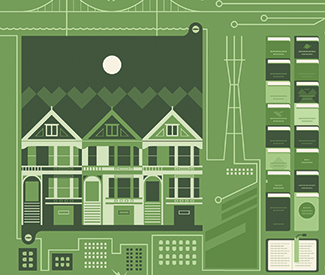steve@sfbg.com
My appreciation for Facebook had been waning in recent years. Although I still use it almost every day — mostly as a storehouse for digital photos and events listings or as a procrastination tool — I was becoming turned off by its increasing commercialization and ubiquity.
But last month, my eyes were opened to the important role that social media sites can play in our lives, particularly Facebook because of how many people are on it: local friends and acquaintances, extended family, people I grew up with or knew in other places I’ve lived, and friends of my friends and loved ones.
My girlfriend, Rhonda Barzon, suddenly slipped into a coma on the afternoon of Dec. 1, the result of pressure in her brain that had caused a severe headache and nausea, triggering our early morning trip to the hospital. The next day, doctors concluded she was brain dead and we shut off the ventilator the following day.
I’m still in shock over her death, but the support that I and her family received through Facebook has been a huge source of comfort and connection. Our ability to communicate what was happening with Rhonda was made easier and more far-reaching through the use of Facebook, eliminating many of the countless phone calls we would otherwise have had to make during those difficult days.
People were profoundly affected by Rhonda’s unexpected death, both people who knew her well and those who just followed our storybook romantic rise from afar, including people from our extended community, her family, and those she knew from previous phases of her life.
As the unfolding news of her condition trickled out in Facebook updates and comments, people were able to look at photos and posts from our charmed eight-month relationship and see just how happy we were. It helped that Rhonda was such a luminous woman with an amazing smile, but I heard again and again from people how truly happy she seemed. And she was, which turned out to be one silver lining in this tragic story, one reinforced by this online record of our life together.
The breadth of the emotional impact of Rhonda’s unexpected death and its amplification by Facebook was epitomized a week later by the woman who stopped me on the street in my neighborhood and told me, “I’d really like to give you a hug because I know who you are and I know what happened.”
It was a sweet, touching moment that augmented the support that I was getting from my immediate physical community.
I understand and even share the concerns that people have about Facebook and other online realms, which can offer the illusion of community connection while actually feeding our sense of isolation. It can make us more narcissistic and self-absorbed, a concern I even raised with Rhonda a week before she died, asking whether we were posting too many lovey photos of ourselves on Facebook.
Now, I’m just happy that we did. For good or ill, our lives and her death played out in vivid fashion before thousands of people in real time, something that has immortalized this tragedy and the amazing woman at the center of it. And it has given me solace for which I’ll always be grateful, from the hundreds of simple statements of support through Facebook comments to long, deeply personal messages privately delivered to me to hugs on the street from random strangers.
Thank you all, and thank you, Facebook.

